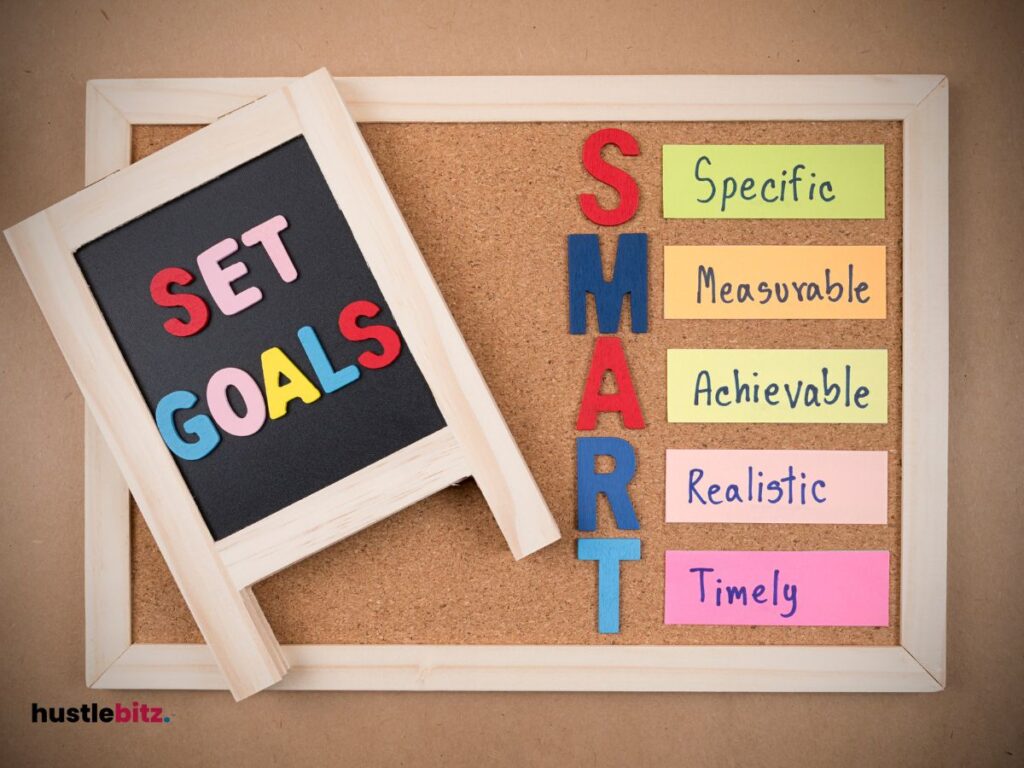SMART goals are a structured framework designed to enhance career development. The acronym stands for Specific, Measurable, Achievable, Relevant, and Time-bound. Specific goals clarify desired outcomes, while measurable objectives allow for tracking progress. Achievable targets ensure that your ambitions align with your current abilities. Relevance connects these goals to your long-term career vision, and time-bound elements establish urgency. By incorporating these components, professionals can set effective goals that adapt over time. Understanding how to implement each aspect can lead to more meaningful career growth and success. Explore further to uncover practical applications for your career journey.
Key Takeaways
- SMART goals are defined by being Specific, Measurable, Achievable, Relevant, and Time-bound, guiding career development effectively.
- Establishing clear metrics allows for systematic evaluation of progress towards achieving career goals.
- Regular feedback and reflection help refine goals and track personal and professional growth.
- Networking and mentorship enhance goal relevance by providing insights into industry trends and expectations.
- Setting timeframes creates urgency, accountability, and helps prioritize tasks for successful career advancement.

Components of SMART Goals

The components of SMART goals—Specific, Measurable, Achievable, Relevant, and Time-bound—provide a structured framework for effective career development planning. By incorporating these elements, individuals can ensure that their goals align with their career aspirations, fostering personal motivation and professional growth. Each component plays a vital role in guiding the goal-setting process.
Specificity in goals helps clarify the desired outcome, allowing for effective resource allocation and focused skill enhancement. Measurable objectives establish success metrics that enable individuals to track their progress and make informed adjustments where necessary. Achievability ensures that the goals set are realistic, taking into account one’s current abilities and available resources.
The relevance of a goal connects it to an individual’s long-term vision, ensuring that efforts contribute meaningfully to overarching career ambitions. Time-bound goals create urgency and help prioritize tasks, facilitating accountability partnerships that encourage consistency and commitment. Feedback mechanisms are also essential; they allow for regular evaluation of progress and adjustments based on constructive insights.
Incorporating these components into career development strategies can significantly enhance the likelihood of success, as they promote a disciplined yet flexible approach to achieving one’s objectives. By embracing SMART criteria, individuals not only define their milestones effectively but also engage in a continuous cycle of improvement, ultimately driving their professional journey forward.
Setting Specific Goals

A clear understanding of how to set specific goals is vital for transforming general aspirations into actionable steps that drive career advancement.
Specific goals help individuals focus their efforts and clarify their intentions, enabling them to align their actions with their career aspirations. To set these goals effectively, one must first conduct a skill assessment to identify strengths and areas for improvement. This process fosters personal motivation and ensures that the goals are relevant and achievable.
Identifying a target audience for one’s professional development is crucial. By understanding who will benefit from one’s skills, individuals can tailor their goals accordingly. Engaging in professional networking can uncover mentorship opportunities that provide guidance and support in navigating industry trends. Networking also opens doors to collaborative projects that can enrich one’s experience and knowledge base.
In addition, incorporating feedback mechanisms allows individuals to gauge their progress and refine their goals as needed. Setting aside time for self-reflection practices can help in evaluating personal growth and identifying new areas for development.
Lastly, committing to continuous learning is essential, as it enables professionals to stay abreast of industry trends and evolving skills demands.
Measuring Your Progress

Establishing clear metrics is essential for effectively measuring progress towards career development goals. Progress tracking involves the systematic evaluation of various performance metrics that can indicate how well one is advancing towards their objectives. By defining specific success indicators, individuals can better understand their achievements and areas needing improvement.
Incorporating feedback loops is crucial for ongoing assessment. Regularly obtaining feedback from accountability partners, such as mentors or colleagues, fosters a collaborative environment where individuals can discuss challenges and celebrate personal milestones. This partnership not only enhances motivation but also contributes to a growth mindset, encouraging individuals to embrace learning opportunities.
Skill assessment plays a significant role in measuring progress. Evaluating both hard and soft skills allows individuals to identify strengths and weaknesses, providing a comprehensive view of their development journey. Reflection practices, such as journaling or self-assessment, further enhance this process by promoting self-awareness and critical thinking.
Continuous improvement should be at the forefront of any career development strategy. By setting incremental goals that lead to larger objectives, individuals can create a roadmap for sustained growth. Reassessing goals periodically ensures they remain relevant and achievable, while also allowing for adjustments based on changing circumstances.
Ultimately, measuring progress in career development is not merely about reaching the destination; it is about the journey itself. By fostering a culture of reflection and adaptability, individuals can navigate their paths with confidence and clarity.
Achieving Realistic Goals
Achieving realistic goals requires a careful balance between ambition and practicality, ensuring that objectives are both challenging and attainable. By establishing realistic expectations, individuals can set themselves up for success while fostering an environment conducive to gradual improvement and confidence building.
To create a framework for achieving realistic goals, consider implementing the following practical strategies:
- Set Attainable Milestones: Break down larger objectives into smaller, manageable tasks. This approach allows for resource allocation that is both efficient and effective, minimizing the risk of overwhelm and facilitating steady progress.
- Utilize Feedback Mechanisms: Regularly seek feedback from peers or mentors to evaluate your progress. This not only helps in overcoming obstacles but also encourages adaptability skills, enabling you to adjust your strategies based on real-world input.
- Maintain a Long-Term Vision: While short-term goals are essential, keeping your long-term vision in mind can provide motivation and direction. This perspective helps align your daily actions with your overall career aspirations, ensuring that each step taken is purposeful and contributes to your ultimate objectives.
Incorporating these strategies fosters an environment where realistic goals become not only achievable but also rewarding.
As individuals navigate their career paths, the combination of ambition, adaptability, and structured planning can lead to sustained success and fulfillment.
Ensuring Relevance in Goals

Ensuring that goals remain relevant to one’s career path is essential for maintaining motivation and alignment with evolving professional aspirations. To achieve goal alignment, individuals must continuously assess their career aspirations in relation to changing industry trends. This involves not only setting goals that focus on skill enhancement but also recognizing the importance of personal motivation in driving progress.
In a dynamic work environment, consistent performance evaluation is crucial. By regularly reviewing achievements and setbacks, professionals can adapt their goals to better reflect current realities and future aspirations. This adaptability allows for the incorporation of mentorship opportunities, which can provide guidance and support in navigating career paths.
Networking strategies also play a vital role in ensuring relevance in goals. Building a robust professional network can offer insights into industry trends and emerging skills that are in demand, facilitating informed goal-setting. Additionally, striking a balance between work and personal life is essential; goals that neglect this aspect can lead to burnout and decreased job satisfaction.
Ultimately, when professionals commit to setting relevant goals, they enhance their overall job satisfaction and career fulfillment. By aligning their aspirations with industry demands and personal values, they can maintain a clear trajectory towards success. This ongoing process of evaluation and adjustment ensures that goals remain meaningful and aligned with both personal and professional growth in an ever-evolving landscape.
Establishing Timeframes

Setting clear timeframes for career goals is crucial for maintaining focus and measuring progress effectively. Establishing a structured timeline allows individuals to employ effective time management and deadline strategies, ensuring that each step taken aligns with their long-term vision. By implementing prioritization techniques, professionals can identify which goals require immediate attention and which can be scheduled for later.
To optimize the establishment of timeframes, consider the following:
- Milestone Planning: Break down larger goals into smaller, manageable milestones. This approach keeps you motivated and allows for regular assessment of progress.
- Time Blocking: Allocate specific blocks of time in your schedule dedicated solely to working on your goals. This method enhances productivity and minimizes distractions.
- Review Intervals: Set regular intervals for reviewing your progress. These accountability measures help you stay aligned with your deadlines and adjust your strategies if necessary.
Incorporating scheduling methods, such as daily or weekly planners, can facilitate the tracking of tasks associated with your goals.
Additionally, utilizing productivity hacks can enhance efficiency and ensure that your efforts yield the desired results.
Examples of SMART Goals

Having established effective timeframes for career goals, it is important to articulate those goals clearly using the SMART framework to enhance focus and drive progress. SMART goals are Specific, Measurable, Achievable, Relevant, and Time-bound, making them an essential tool for career development. Here are some examples of SMART goals that align with various aspects of professional growth:
| Goal Type | Example Goal | Outcome |
| Skill Enhancement | Obtain a professional certification in project management within six months. | Improved project management skills, leading to better job satisfaction. |
| Networking Strategies | Attend at least three industry conferences this year to expand my professional network. | Enhanced connections that may lead to mentorship programs or job offers. |
| Leadership Development | Lead a cross-functional team project within the next year, focusing on industry trends. | Development of leadership skills and increased visibility for career growth. |
These examples illustrate how SMART goals can be tailored to individual aspirations, whether they focus on skill enhancement, networking strategies, or leadership development. By setting clear and structured goals, professionals can engage in meaningful performance evaluations and maintain a healthy work-life balance. Achieving these goals not only fosters personal and career growth but also contributes to overall job satisfaction and alignment with industry trends.
Tips for Effective Goal Setting
Effective goal setting requires a clear understanding of one’s aspirations and the strategic steps necessary to achieve them. Implementing effective techniques can enhance your journey towards career development.
Here are three essential tips to guide you:
- Utilize Goal Visualization: Visualize your goals clearly to strengthen motivation. Create a vision board or detailed mental imagery of your desired achievements. This technique can enhance focus and commitment, making your aspirations feel more attainable.
- Engage Accountability Partners: Identify individuals within your professional network who can serve as accountability partners. Regular check-ins with these partners can help you stay aligned with your goals, providing necessary feedback mechanisms and motivation techniques to overcome challenges. They can also assist in skill assessment, ensuring you are on track with your personal growth.
- Implement Time Management Strategies: Effective time management is crucial for achieving your goals. Break down larger objectives into smaller, manageable tasks and establish deadlines. This will not only help in maintaining goal alignment but also create opportunities for success celebration as you reach milestones along the way.
Final Thoughts
Setting SMART goals is essential for effective career development, providing a clear and structured framework to guide your progress. By focusing on Specific, Measurable, Achievable, Relevant, and Time-bound objectives, you can create actionable steps that align with your professional aspirations. Regularly measuring your progress and incorporating feedback ensures that your goals remain relevant and adaptable to industry changes. Embracing these principles and integrating effective time management strategies will help you stay motivated and on track, ultimately leading to meaningful career growth and success.




